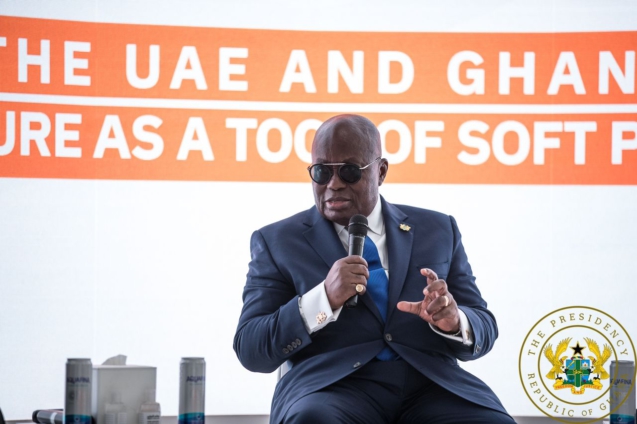
Audio By Carbonatix
Ghana is in talks with Emirates National Oil Co. for a barter arrangement that will enable the West African nation to buy fuel with gold.
The government reached a “tentative” agreement with the Dubai-based oil firm, said Kabiru Mahama, an economic adviser to Vice President Mahamudu Bawumia.
Ghana, Africa’s second-largest gold producer, last week ordered large mining companies to sell 20% of the metal they refine to the central bank from January 1 as it builds up reserves of bullion to be used to import fuel and reduce demand for dollars after its currency plunged 57% this year.
“We’re open to any international oil-trading company that is interested,” Mahama said in a phone interview on Friday.
“Starting next October, all our oil-product needs would be swapped for gold.”
Ghana is struggling to stabilize its economy and sees the barter system as a way to stem a slide in the cedi -- the world’s worst performer among currencies tracked by Bloomberg.
The weakening cedi is fueling inflation and depleting the nation’s foreign-exchange reserves.
Meanwhile, President Nana Akufo-Addo’s government, which lost access to international capital markets this year because of ballooning debt and loan-service costs, plans to ask international bondholders to accept losses on their investments to pave the way for an International Monetary Fund bailout.
ENOC didn’t immediately respond to an email and a phone message requesting comment. Dubai’s government, which owns ENOC, also didn’t immediately respond to an email seeking comment.
Government-to-Government
Dubai has a long association with the gold trade. While critics say that regulatory loopholes allow bullion used for money laundering and smuggled out of war zones to be traded in the city, Dubai’s commodities exchange has rejected those claims.
Gold trading was brought into the United Arab Emirates’s federally managed anti-money laundering reporting system last year.
“ENOC is interested in giving us refined oil for gold,” Steve Opata, head of financial markets at the Bank of Ghana, said in an interview on Monday.
“Depending on what quantities they are committed to giving us, we will give them the equivalent in gold. This is a government-to-government program.”
Ghana spends about $10 billion annually on imports, of which 48% is spent on purchasing fuel.
The government expects bartering gold for refined crude will help it rebuild gross international reserves that fell to $6.7 billion at the end of October, enough to cover just 2.9 months of imports, from $10.8 billion a year earlier.
The plunging currency resulted in inflation accelerating to 40.4% in October. That prompted the central bank to raise borrowing costs by 250 basis points to 27%, the highest level in more than 19 years.
The Bank of Ghana will buy the gold from mining companies in cedis. Ghana began buying gold last year -- the first time in 60 years -- to bolster its foreign reserves. The latest move ramps up the purchases.
“If we implement it as envisioned, it will fundamentally change our balance of payments,” Bawumia said in a Facebook post.
Oil importers’ demand for dollars “in the face of dwindling foreign-exchange reserves results in the depreciation of the cedi and increases in the cost of living with higher prices for fuel, transportation and utilities,” he said.
Latest Stories
-
Adom FM’s ‘Strictly Highlife’ lights up La Palm with rhythm and nostalgia in unforgettable experience
2 hours -
Ghana is rising again – Mahama declares
5 hours -
Firefighters subdue blaze at Accra’s Tudu, officials warn of busy fire season ahead
6 hours -
Luv FM’s Family Party In The Park ends in grand style at Rattray park
6 hours -
Mahama targets digital schools, universal healthcare, and food self-sufficiency in 2026
6 hours -
Ghana’s global image boosted by our world-acclaimed reset agenda – Mahama
7 hours -
Full text: Mahama’s New Year message to the nation
7 hours -
The foundation is laid; now we accelerate and expand in 2026 – Mahama
7 hours -
There is no NPP, CPP nor NDC Ghana, only one Ghana – Mahama
7 hours -
Eduwatch praises education financing gains but warns delays, teacher gaps could derail reforms
7 hours -
Kusaal Wikimedians take local language online in 14-day digital campaign
8 hours -
Stop interfering in each other’s roles – Bole-Bamboi MP appeals to traditional rulers for peace
8 hours -
Playback: President Mahama addresses the nation in New Year message
9 hours -
Industrial and Commercial Workers’ Union call for strong work ethics, economic participation in 2026 new year message
11 hours -
Crossover Joy: Churches in Ghana welcome 2026 with fire and faith
11 hours

